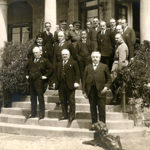Published December 30, 2009
The best thing about The Dismal Science: How Thinking Like an Economist Undermines Community is the title. Stephen Marglin is absolutely right that something is wrong with modern economics, particularly its treatment of communities of all kinds, including the family. But the Harvard economist fails to correct the problem for two reasons: first, his ignorance of the scholastic economics that prevailed for five centuries before Adam Smith, the most important element of which described the interpersonal relations that represent the foundation of community; and second, his turning instead to sociology, unaware of how that discipline depends upon the very economic theory that he decries.
At his best, Marglin traces the shift in economic thinking “from Hobbes to Smith, by way of Locke and Mandeville,” in a narrative efficiently structured around concise and apposite quotations. With equal efficiency he includes, while confining mostly to an appendix, the necessary qualifications and technical aspects of his argument. “There is dissent and disagreement in economics,” he acknowledges. “Notwithstanding the variety, the mainstream, in my view, is so dominant that the other streams have become mere trickles. . . . It is this consensus to which the term economics applies in this book.”
Yet the Harvard professor’s narrative is weak at a number of points. If one asks exactly which elements Thomas Hobbes or John Locke or Bernard Mandeville or Adam Smith added to economic theory, the correct answer is “none.” As Joseph Schumpeter demonstrated in his History of Economic Analysis (1954), “The fact is that the Wealth of Nations does not contain a single analytic idea, principle or method that was entirely new in 1776.” But the same could be said of Hobbes in 1651, Locke in 1689, and Mandeville in 1705. Though citing Schumpeter’s History and Aristotle’s Nicomachean Ethics, Marglin fails to acknowledge the implications of either work on his own. Schumpeter showed that Aristotle had laid down the first outline of economic theory, but starting with Thomas Aquinas in the thirteenth century, it was “the scholastics and natural-law philosophers” who “worked out all the elements of economic analysis.” Yet Marglin says nothing about the economics of Aristotle and the scholastics.
Marglin’s premise is that economics is essentially a sociological phenomenon, the content of which is constructed by the prevailing consensus of self-identified elites calling themselves economists — rather than recognizing economic behavior as something that is inherent in human nature, knowledge of which determines who is an economist. Margin thus expects the reader to supply an entire worldview and an extraordinary amount of intellectual background that he has not supplied.
The “internal” critique by neoclassical economists has been unavailing, Marglin argues, because it is merely “structural;” that is, it accepts the “foundational assumptions” of the prevailing consensus. What is needed instead is “an external critique based on [rejecting] the foundational assumptions of self-interested individualism, rational calculation, the nation-state, and unlimited wants.” He describes these alternatively as “the founding myths of economics: individualism, knowledge as algorithm, the nation as the sole legitimate authority, and unlimited wants.” “Self-interested” is the crux of the problem, but Marglin fails to explain how theory should be corrected; the other three points are excess baggage.
From what external vantage point is a “foundational” critique to be mounted? From sociology. Adopting the thesis of Ferdinand Tönnies (1855-1936), Marglin argues that what ails both modern society and economic theory is too much Gesellschaft (“association,” which Tönnies defined as rational, goal-oriented, and self-seeking) and too little Gemeinschaft (“community,” described as an end in itself arising from irrational common feeling). This may explain why Marglin writes even more about Tönnies’s more famous colleague Max Weber (1864-1920) and Weber’s American disciple and co-founder of the Chicago school of economics, Frank Knight (1885-1972).
Behind Weber and Tönnies, though not mentioned in Marglin’s book, is Auguste Comte (1798-1857), who conceived sociology as the new master science. Comte linked his new positive philosophy with a positive religion, a cult of “the Great Being, Humanity,” complete with elaborate rituals, a calendar, and Comte himself as high priest — “Catholicism minus Christianity,” as the agnostic Thomas H. Huxley acerbically but accurately put it in 1869.
Tönnies’s and Weber’s “anti-positive,” and supposedly “value-free” sociology, superseded Comte’s embarrassing original version. Yet Weber and Tönnies retained Comte’s premise, adopted from David Hume, that “Reason is, and ought only to be, the slave of the passions, and can never pretend to any other office than to serve and obey them” (Treatise of Human Nature). In short, man is only a semi-rational or clever animal: highly adept at calculating means but having no choice of ends but emotional self-gratification. Weber had trained and identified himself as a neoclassical economist of the then nascent Austrian School; he imported its individualistic premises into his own remarkably anti-social sociology — which described the interaction between two agents in the market as “the archetype of all rational social action” and argued that “coercion, physical or psychic, lies at the root of nearly all social relationships,” including family and religion.
Because of these blind spots, Marglin fails to recognize that an effective “foundational” critique of neoclassical economics is necessarily also a “structural” one, because the logical-mathematical structures of scholastic, classical, and neoclassical economic theories differ fundamentally.
Tönnies had derived his theory of Gemeinschaft und Gesellschaft from Sir Henry Maine’s (1822-1888) earlier Whiggish thesis that “the movement of the progressive societies has hitherto been a movement from Status to Contract.” But Aristotle had anticipated and contradicted Maine, Tönnies, and Marglin in the fourth century B.C. when he showed that every human society is naturally based on both status and contract, distinguishing “distributive justice” from “justice in exchange:” “All men agree that what is just in distribution must be according to merit in some sense, though they do not all specify the same sort of merit, but democrats identify it with the status of freeman, supporters of oligarchy with wealth (or with noble birth), and supporters of aristocracy with excellence” (Ethics 5.3). Justice in exchange, by contrast, requires “arithmetical equality” of values exchanged because it “treats the parties as equals” (Ethics 5.4).
Seven centuries later, Augustine showed that the same “geometric ratio” that Aristotle applied to distributive justice within families and political communities also explains personal gifts between individuals. “Human society is knit together by transactions of giving and receiving,” Augustine noted in his “Letter to Simplician.” But these outwardly similar transactions are of two essentially different kinds, “sale or gift,” he added (“On Free Will”). Yet all personal, domestic and political distribution is practically limited by the fact of scarcity: “Since you cannot do good to all,” wrote Augustine, “you are to pay special regard to those who, by the accidents of time, or place, or circumstance, are brought into closer connection with you” (“On Christian Doctrine”).
Economics, as taught at the highest university level since Aquinas, integrates four elements from Aristotle and Augustine at the personal, domestic, and political levels: Aristotle and Augustine’s theory of distribution (which describes our choice of persons as “ends” of our action);
Augustine’s theory of utility (which describes our ranking of scarce means devoted to consumption by or for those persons); and Aristotle’s theories of production and justice in exchange (by which we bring those means into being).
Adam Smith “de-Augustinized” economics by abandoning the scholastic theories of distribution and consumption, thus launching classical economics with production and exchange alone. What Smith termed, and Marglin accepts, as “distribution” is actually compensation as described by Aristotle’s “justice in exchange”: the equality of labor and property income with the value that each contributes to the value of the final product-but coupled with Smith’s peculiar assumption that everyone is driven solely by “self-love.” Marglin wants to abandon this workhorse theory of “marginal productivity” without an empirically verifiable substitute.
Since early neoclassical economists almost simultaneously but independently reinvented Augustine’s theory of utility in the 1870s, the main difference among the three economic theories is the presence or absence of the scholastic theory of distribution. Marglin describes even his own economics as a sociological artifact, saying he entered the field when “young people were attracted to economics by large questions, including the relationship between efficiency and equity, the poverty of some and the wealth of others, socialism versus capitalism.” Yet the same description applies to the Chicago School’s George J. Stigler and Milton Friedman, who by adopting many of the premises that Marglin uses, were highly successful in running rings around advocates of Keynesian theory and steering the American economics profession in the libertarian direction against which Marglin rails.
But it’s easy to see why Stigler and Friedman succeeded while Knight did not and Marglin will not: They recognized, as Stigler put it in his The Theory of Price, that “it takes a theory to beat a theory: if there is a theory that is right [only] 51 per cent of the time, it will be used until a better one comes along.” Burdened by the theories of Hume, Comte and Weber, Marglin thinks that having a rational theory, which he dismisses as simply “algorithmic knowledge,” is part of the problem, not the solution.
With all due respect to the Harvard scholar, it still takes a theory to beat a theory. The next revolution in economics is likely to be a “neoscholastic” one. By restoring the original scholastic outline, the new paradigm will explain much more with a simple, rational, and empirically verifiable interpersonal theory — but won’t require economists to lug around Hume, Comte, Weber, Tönnies, as well as Marglin’s excess baggage.
Mr. Mueller, an economic forecaster, is director of the economics and ethics program at the Ethics and Public Policy Center in Washington, D.C., and author of Redeeming Economics: Rediscovering the Missing Element (ISI Books, 2010).












